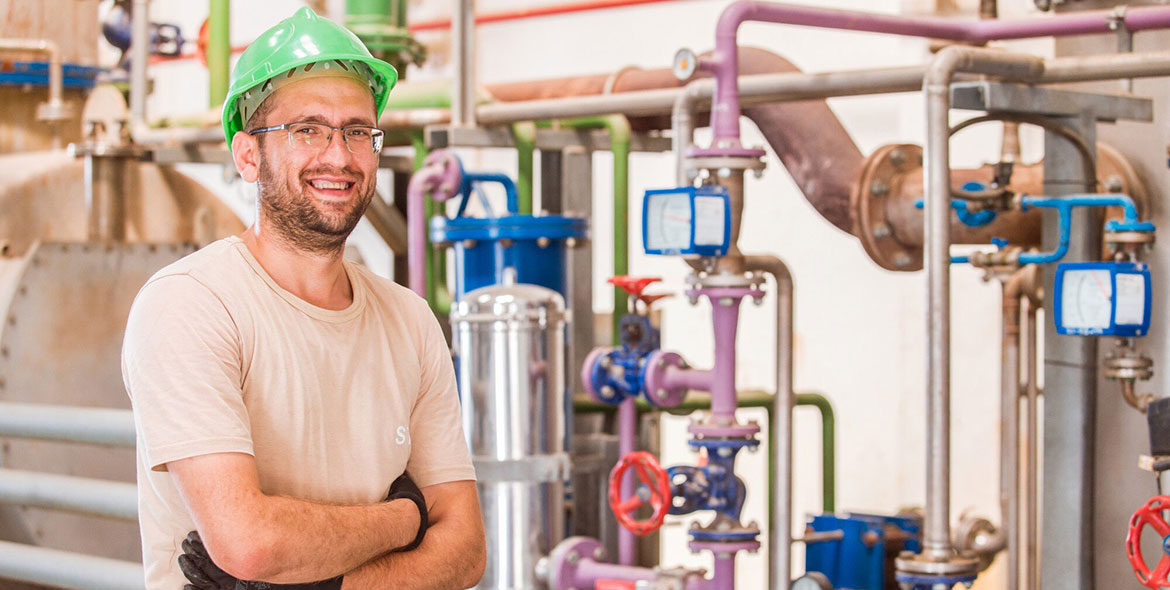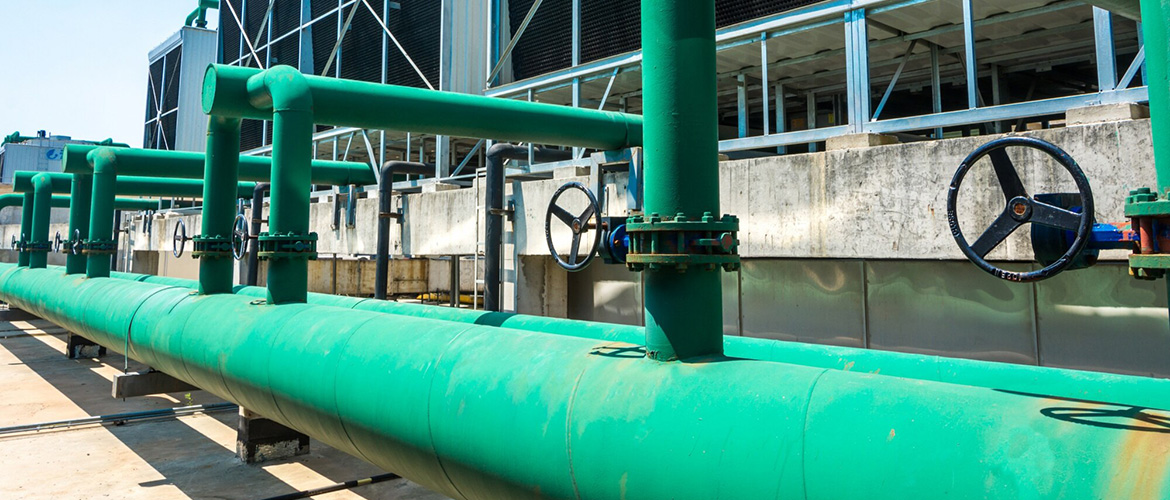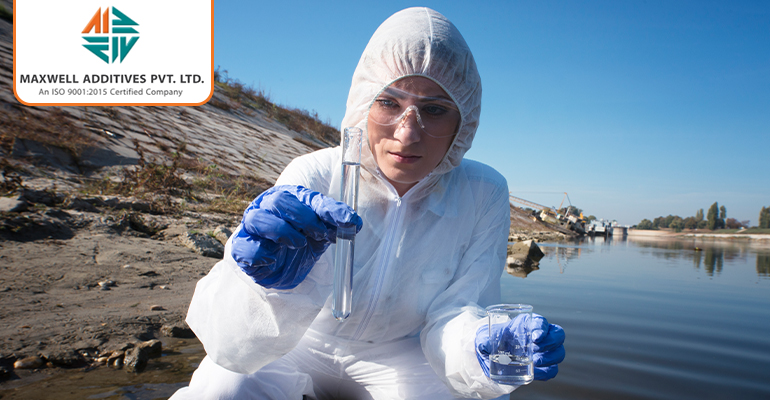In addition to the water required for drinking and sanitary use by employees and for fire protection, most industrial establishments require larger amount of water for cooling, boiler feed and process use. Thus, 1) Cooling is the largest industrial use for water. 2) Process water is the second largest industrial use and 3) Boiler feed is the third largest industrial use of water. For these industrial uses, the quality of water required for specific application is as important as the availability of a sufficient quantity. The general quality criteria for waters are that they should neither permit the formation of deposits, which reduce heat transfer or increase resistance to the flow of water,...
Achieving Pure Water Through Effective Water Treatment chemicals – Maxwell Additives Pvt Ltd

The quality of water plays a major role in industrial processes, equipment lifespan, and environmental safety. To obtain optimal results, facilities must utilize the right Water Treatment chemicals for their specific needs. Understanding the options available and how they work allows operations to implement the ideal treatment plan.
Common Chemicals Used in Industrial Water Treatment.
Various chemical additives serve critical functions in industrial water purification. Let’s learn more about the different water treatment chemicals available.
- Coagulants – Compounds like aluminum sulphate force suspended particles to clump together so they can be filtered out. This removes turbidity to clear the water.
- Flocculants – Polymers like polyacrylamide cause small particles to agglomerate into larger “flocs” that can settle out easily. This gets rid of colloidal contaminants.
- Biocides – Chemicals like sodium hypochlorite kill bacteria and other microorganisms. They prevent biological growth and contamination.
- Corrosion Inhibitors – Compounds such as orthophosphate react with metal surfaces to form protective barriers. This prevents system corrosion.
- Antiscalants – Polymer additives stop scale formation by preventing hard mineral precipitation. They keep equipment from fouling with deposits.
- pH Adjusters – Acids and bases like sulfuric acid or sodium hydroxide lower or raise water pH to appropriate levels. Proper pH improves treatment.
Facilities must choose the right chemicals and dosages based on factors like raw water quality, processing purpose, and equipment specifics. Testing regularly verifies optimal conditions are maintained.
Chemical Treatment for Boiler Water Systems.
Chemicals play a vital role in preparing feedwater for steam boilers and maintaining proper boiler operation. Here are the steps associated with chemical treatment using Boiler Water Chemicals.
- Coagulation and flocculation to remove suspended solids that could cause fouling or corrosion.
- Softening to eliminate hard minerals like calcium and magnesium that will lead to scale.
- Deaeration to remove dissolved oxygen that can cause rust and pitting.
- pH adjustment to prevent corrosion in condensate systems.
- Chemical oxygen scavengers that find and bind up residual oxygen molecules.
- Polymer dispersants to suspend any precipitated particles so they can’t deposit on surfaces.
- Antifoaming agents to eliminate problematic foaming in the boiler water.
- A tailored chemical plan minimizes issues like scaling, corrosion, carryover, and foaming that reduce efficiency and lead to breakdowns. This saves on costly maintenance and repairs.

Chemical Pretreatment for Reverse Osmosis Systems.
Reverse osmosis filters out contaminants by pushing water through a semi-permeable membrane. Chemical pretreatment prepares the water to preserve membrane life and performance. Here are the steps of using RO treatment chemicals for water purification.
- Adjusting pH to the optimal range for the membrane with acid or base.
- Adding scale inhibitors like phosphonates to prevent mineral precipitation.
- Introducing coagulants and flocculants to eliminate colloids that could foul the membrane.
- Utilizing biocides and metal chelators to prevent biological growth and oxide deposits.
- Adding antiscalants if needed to further control troublesome scaling.
Pretreatment removes contaminants and conditions the water to avoid problems that shorten membrane lifespan or reduce purity. This minimizes operating costs.
Chemicals for Wastewater Treatment Plant Effluent.
Before water leaves a treatment plant, final disinfection and conditioning ensure the effluent meets regulatory standards. This may require:
- Chlorine, chlorine dioxide, or ozone disinfection to eliminate pathogens.
- Dechlorination with chemicals like sulphur dioxide or sodium bisulfited if residual chlorine level is too high.
- pH correction with acid or base to achieve neutral range.
- Supplemental filtration or coagulation if suspended solids level is still excessive.
- Fluoride addition in drinking water plants to improve dental health.
Proper chemical treatment removes contaminants of concern and brings the effluent within specified parameters for safe reuse or release into the environment. This protects public health. There should be an effluent treatment plan available for water treatment. Then it is possible to make sure that clean water is supplied at all times. It will assist in overcoming all the problems that unclean water can trigger.
Achieving Water Purity Through Chemical Solutions.
Reliable water treatment relies on the right chemicals carefully applied by knowledgeable specialists. Work with an expert provider to develop custom chemical treatment that tackles your facility’s specific water challenges. With strategic use of coagulants, inhibitors, scavengers, and other compounds, you’ll obtain water that meets your needs for purity, safety, and system preservation.
This Article is a General Idea of the Product and Its Related Fields to Let Aware the Concern Person About Product. We Do Not Claim Anything Mentioned in the Article / Paper. No Liability Would Be Accepted for the Consequences Arising From Using It in Full or Part.



